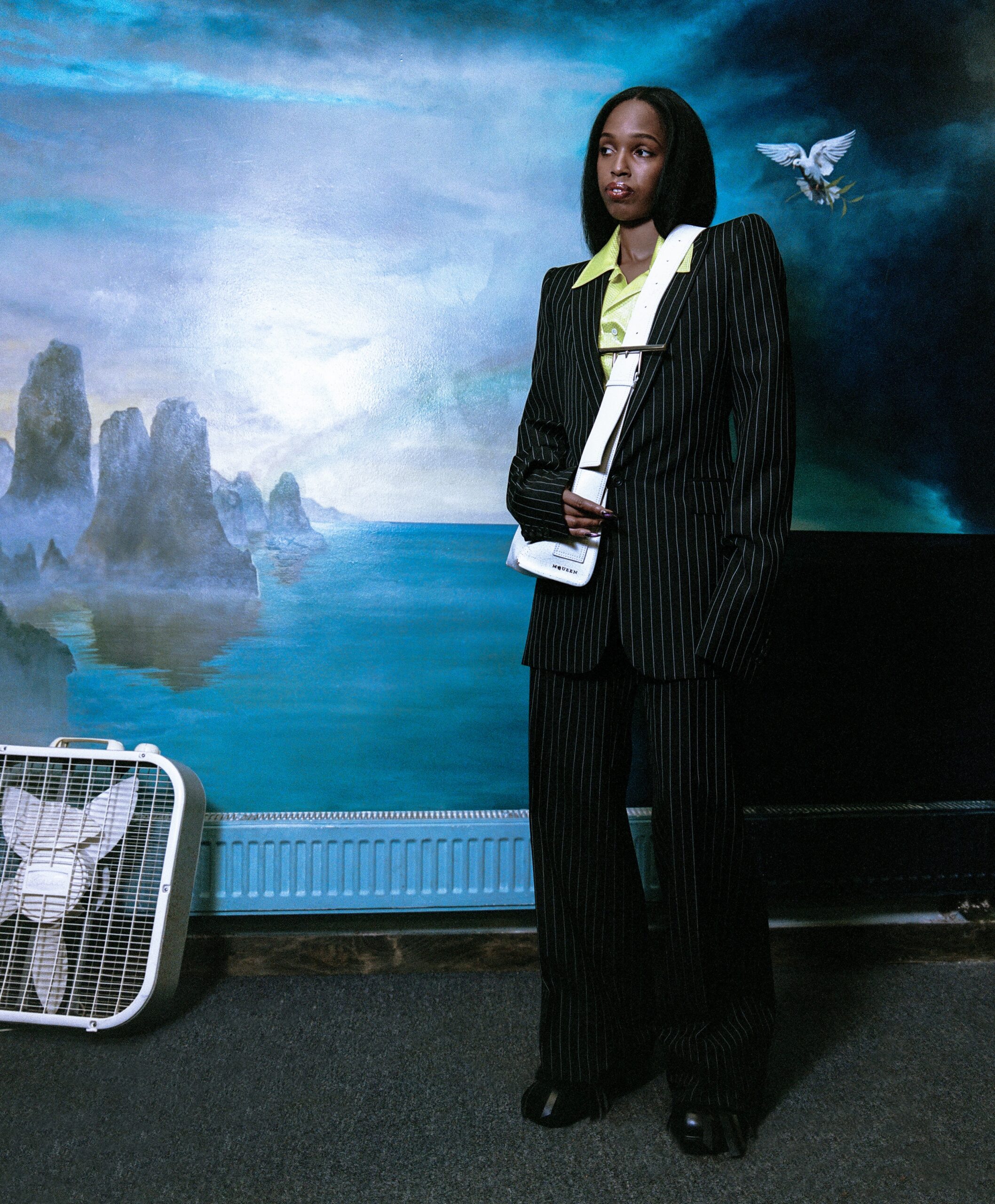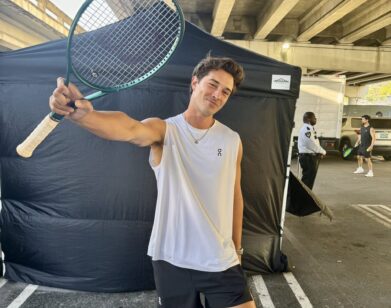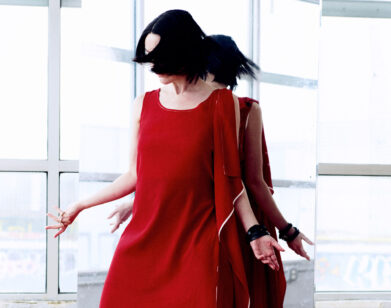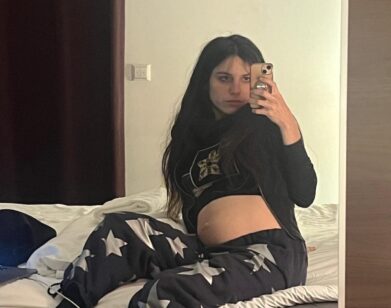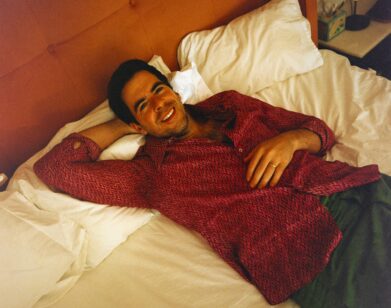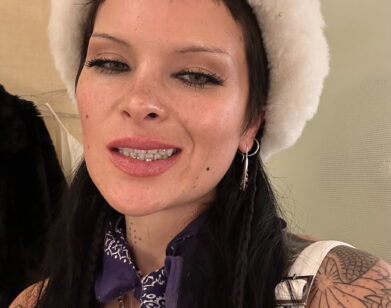COME-UP
“If That Shit Melt, Lord Have Mercy”: John Glacier, in Conversation With Lucien Clarke
People call her mad, John Glacier calls it a mission. The enigmatic Hackney-born rapper and producer first broke the ice on her hazy, stream-of-consciousness sound in 2021, and since then she’s worked with Flume and Surf Gang and gotten big-ups from fashion houses and rap stars alike. After opening for Sampha and Jamie XX and dropping Like A Ribbon and Duppy Gun this year, she’s grinding out the third part of her sonic unraveling. “Once I have my mind on something, I’m like a pitbull,” she tells her friend, the skater Lucien Clarke, when they met up in London shortly after her first-ever hometown headline show to talk persistence, poisonous flowers, and paying back her parents.
———
LUCIEN CLARKE: So when did you first realize you were a bloody legend?
JOHN GLACIER: [Laughs] I just felt it in my bones. I said, “Oh shit.”
CLARKE: In your fingers and toes.
GLACIER: Literally. I had a feeling and just ran with it.
CLARKE: I’ve never talked to you about it, but I’m a big fan of your music.
GLACIER: Oh, thank you.
CLARKE: Always have been. Exciting times, isn’t it? New shit on the way.
GLACIER: New stuff on the way.
CLARKE: When were you first like, “All right, I’m doing this type [of music]?”
GLACIER: As soon as I started making music, I said, “I’m doing this.” And there was no way out. Like, I’m going to reach where I want to reach with this. And I had no money or time, simply because I was recording in studios. I was like, “I’m going to go without money.” I even borrowed money from my parents.
CLARKE: You’ve even stolen it.
GLACIER: No. [Laughs]
CLARKE: No, I’m joking.
GLACIER: Not yet. But I was like, “Next year, I’m going to have some money and pay everybody back.”
CLARKE: Yeah.
GLACIER: And everyone thought it was a joke, but I like to make plans. I’m a planner. I make deadlines for myself and targets and goals and when I don’t reach them, I’m underwhelmed and disappointed. When things are going well I’m just like, “I expected it to happen at this time because I worked for this.”
CLARKE: That reminds me, you know Nardo Wick, the rapper? He said something like that where he had a bucket and he asked all his family members, “Everyone put 100 bucks in here for studio time.” And some didn’t, obviously, but the majority did, and then—
GLACIER: He paid it back. I hear it. Believe in yourself, pray for something. If people think you’re mad, as long as you know you’re not mad, it doesn’t matter.
CLARKE: That’s true.
GLACIER: It really doesn’t matter. Because when they see what you have achieved, they’re like, “Oh shit.”
CLARKE: It’s always afterwards. They won’t get it until they see the dollars or the pounds. Like, I quit school and everything.
GLACIER: Oh, did you? I didn’t know that.
CLARKE: I used to bunk school a lot. My school at the time was a weird naval school down the street from Southbank. I used to put my skate clothes in a black bag and leave it in the basement. I’d get to school at 7:00 a.m. or whatever and then change and just go to Southbank and just be there the whole day.
GLACIER: Wow.
CLARKE: I’d do it to a point where obviously my mom got the call like, “He’s not really been in.” So she stole my skateboard. She was like, “You ain’t doing this shit no more.” It’s ironic because her partner at the time bought me my first one.
GLACIER: People are like, “What’s going on? Is he okay?” But if you’re passionate about something…
CLARKE: Yeah. Then she sent me off to my uncle’s in Tampa, and she had no idea one of the biggest skate parks is right down the street from his house. They do loads of comps there. And when I was actually there, Element Skateboards offered to pay me, which was crazy for me back then, way before Palace. Then Lev [Tanju, of Palace] was like, “Look, I’m starting this thing,” and that was when my mom was like, “All right, you can have the skateboard back.” And I’ve never really thought about it until you mentioned it. It’s funny how life works out like that.
GLACIER: Long road, but it all worked out.
CLARKE: Definitely. What was your moment like that?
GLACIER: Funny enough, I didn’t have any inspiration. I just had no one to talk to. Before, I used to write poems, basically. I was writing, and then I start beat-making. When you’re a new artist, getting people to take you seriously is kind of hard. So I just got on my own beats. I put them on SoundCloud. Then after that, I started getting beats from other people. But once I have my mind on something, I’m like a dog. I’m like a pitbull.
CLARKE: Once you take a bite, you’re like—
GLACIER: “This is what I’m doing.” There was no way music wasn’t going to work out.
CLARKE: That’s exactly where I was at. Everyone’s like, “What’s this going to do in the future? Blah blah blah.” And you’re like, “Nah, it’s going to work.”
GLACIER: Literally. I might not be able to look after myself now, but give me a couple of years. It’ll be worth it. It’s like going to school. There definitely were schools for music, but I wasn’t eligible to go to those. So the way we’ve taken it on is we treated it like school. When you go to school, there’s a certain amount of years you have to put in to qualify. It’s the same thing with skating or writing or producing. You’ve got to put enough time in and you’re going to qualify if you dedicate yourself enough.
CLARKE: Crazy. If I have kids, I’m going to have to be prepared for that. They might not be into your field, and they’ll be like, “No, I know what I’m doing.”
GLACIER: It’s their life at the end of the day, you know. They might make some dumb decisions, but they’ll figure it out in the end. And they can’t just learn off of your experiences, because that’s not really learning. It’s like, if I gave you all the answers and maps, you won’t fucking learn.
CLARKE: Exactly. Kanye said something about only taking advice from people that are more successful than you. You can take something from that.
GLACIER: I hear what you’re saying.
CLARKE: He also said that there’s people younger than him who are more successful
GLACIER: Yeah. My dad always says that he’s grateful for his kids. He always said there’s so much that he learned from us. That even with us being stubborn towards him, he’s learned—
CLARKE: Are you stubborn?
GLACIER: Yeah, I’m very stubborn.
CLARKE: I think you need that. I don’t like being told what to do.
GLACIER: No.
CLARKE: And I love to learn the hard way, because I feel that’s the best way to learn.
GLACIER: Yeah, because you need the experience sometimes.
CLARKE: How’d you get the name? Where did “John” come from?
GLACIER: That’s the thing, isn’t it? John was Jesus’s favorite, according to the Bible.
CLARKE: Hard. Was that your name from the beginning, when you were making beats?
GLACIER: Yeah. Just came out the womb: John Glacier.
CLARKE: And the Glacier, where’d that come from?
GLACIER: Glaciers have many layers. They’re very grand. But also with glaciers, we do so much harm to the earth and we’ve got all of these problems on earth, and if a glacier melts, it’s a nightmare. So I might look nice and serene and calm and peaceful—
CLARKE: But if that shit melt, lord have mercy.
GLACIER: Trouble me enough, I’m going to flood out everything.
CLARKE: [Laughs] Extinction, isn’t it?
GLACIER: Yeah. Glacier. And I think there’s so much life within glaciers. There’s so much stuff we haven’t discovered within them. We’re going to find a lot of animals. We’re going to find a lot of stuff that we need to know about earth within them.
CLARKE: Some things we will never find out. We can try. But we might die.
GLACIER: Literally. I want to be a glacier.
CLARKE: Sick. I always wondered that. What made you decide to sign with Young?
GLACIER: I’ve known him for years. When I first started making music, they had a rooftop in the label offices. I used to go there and just write on the rooftop. And they had a studio. Determination is not a joke. I was just there, figuring it out. They didn’t really know what I was up to too much. At the time I had a beat that I made on my Macbook, but my Macbook broke. So I thought, fuck it, let me download an app on my phone. Started making beats on the phone. And that beat, the label loved it.
CLARKE: That’s banging.
GLACIER: When I say nothing was going to stop me, nothing.
CLARKE: It’s the only way, really. From here until forever, what do you want to achieve with your music and how do you want people to feel when they hear it? Because when I hear your music, it’s deep and it gets me thinking. I love that I can put it to my own life and memories.
GLACIER: Yeah. I feel like I want people to think, and I want people to want more for themselves when they listen to my music. When I first started making music, it was primarily for women and girls, but I didn’t expect it to take off. Even right now, random girls will be like, “Oh my gosh, that project,” and they’ll tell me about an experience that they’ve had.
CLARKE: Even with the raps, it’s subtle. With a lot of female artists, they just talk crazy. They’re the main subject. And when you’re doing it, you’ll dip in and keep moving where it’s not the whole song.
GLACIER: I know what you mean. I’m not one to be scared to say what I want to say. Sometimes I am. But that’s something that I strive toward. If you want to say something, just say it. Believe in yourself, stand up for yourself, and do what you’ve got to do in this life. I want people to feel more confident. But I also want people to understand that if you’re feeling down, it’s good to feel what you’re feeling, and you’re not going to get out unless you feel that, you know?
CLARKE: Yeah. It’s not good to hold it in. You have to express it somehow.
GLACIER: What you can’t get out, it just lives in your head rent free. It’s definitely good to see an outside person, too, to free your mind.
CLARKE: Yeah. So you announced your third project at the last show that you had.
GLACIER: Yeah.
CLARKE: Which everyone loved, by the way. So what was the inspiration for having the three parts?
GLACIER: Originally, I wanted an album that had three parts to it. But streaming platforms, their format don’t support the way I wanted to release it. Originally I wanted an album cover, part one underneath it, part two with a separate cover, and part three with a separate cover. So when you click on Like a Ribbon, it would have been the artwork for the overall album. And as those songs go on, the artwork changes.
CLARKE: Sounds cool.
GLACIER: Yeah, but streaming platforms don’t support that format. I should work for these people.
CLARKE: You should be in charge and be like, “Look, actually…”
GLACIER: Exactly.
CLARKE: I love when that happens. There used to be skate videos back in the day on DVD, and everyone got the full half-hour long video, but there might be a little secret thing you click on on the homepage with a whole other video with different edits.
GLACIER: Yes.
CLARKE: I like that. Even with my shoes I got coming out, on the bottom there’s a DC logo that’ll tell you the next color. It will be the color of the next shoe that comes out.
GLACIER: That’s cold. That’s exactly how the album was going to be. They would never know what was going on [at first] but by the second part, you’re like, “Oh…”
CLARKE: It’s that feeling of watching a movie again. Maybe you have to watch it two or three to be like, “That’s why she killed him.” You know what I mean?
GLACIER: Yeah. And that’s why the album was called Like a Ribbon, because a ribbon can change, they take form, they change their shape. If I had a ribbon in a bow and I unravel the bow, it’s all going to fall down. So part one would have been the first unravel, and by part three, you get it.
CLARKE: Right, right. Who did the artwork?
GLACIER: Jim Joe.
CLARKE: You’ve been working with him for forever. The first time I met him was with Virgil and everything. I had no idea what he looked like, obviously. I took a film photo of everyone doing their thing in the studio and he was like, “Hey, seriously, you can’t use that photo.” I didn’t even ask him why. I was like, “All right, cool.” But then later on, I was like, “Oh shit,” because I knew of him.
GLACIER: He gave it away. [Laughs] You’re like, “I didn’t even know.”
CLARKE: How did you guys get in touch?
GLACIER: I like his art. I like the way he thinks. We think similarly, so it’s quite easy to create artwork with him. I don’t paint, I don’t draw. But to come up with an idea that we both agree on and can execute is quite easy because we just bounce ideas back and forth. The way we’re talking right now is how we would come up with artwork. We did a lot of Zoom calls and we discussed what we liked. And then he actually paints it.
CLARKE: How many covers has he done now?
GLACIER: In total there’s four covers. There’s two out now. The next side that is going to be coming out next year is called Angel’s Trumpet. Part two is Duppy Gun. “Duppy Gun” sounds quite dark, but it’s actually just an innocent perfect flower. It’s a purple flower, and apparently it makes a popping sound. Apparently. I’ve never witnessed it.
CLARKE: Popping noise? When it blooms or something?
GLACIER: I have no idea.
CLARKE: Flowers are mad.
GLACIER: Always on some bullshit. [Laughs]
CLARKE: The Japanese know a lot about that. There’s one flower that droops down like a willow tree. It looks like a daffodil, a massive one. Over there they say if you’re underneath it, it makes you crazy. Let me show you.
GLACIER: That’s mad.
CLARKE: I know.
GLACIER: And then the last bit is called Angel’s Trumpet, which is actually a poisonous flower. So that’s what the artwork is. It’s a bit more fun.
CLARKE: It’ll entice you, and then—
GLACIER: Right. It’s like people think they know what these flowers are saying, but no, you don’t.
CLARKE: You’re deep, man. Come on. Banging. Looking forward to it.
GLACIER: Yeah. It should be fun.
CLARKE: I can’t wait.
———
Hair: Junya Nakashima using Oribe.
Makeup: Ayaka Nihei using Dior Beauty at Walter Schupfer Management.
Nails: Leanne Woodley using She Nails It Hydration.
Photography Assistant: Ty Dani.
Fashion Assistant: Nicholson Baird.
Hair Assistant: Lauren Cordan.
Post Production: OneHundredBerlin.
Production Assistant: Jordan Santisteban.
Location: Anima Studios.




